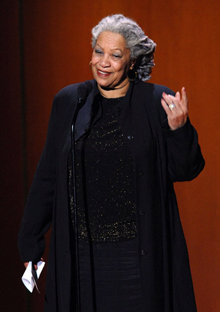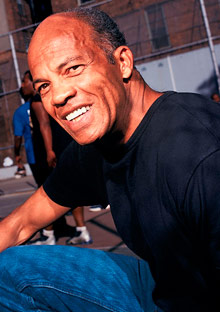Advice for Aspiring Writers

Looking for words of wisdom about writing a book? These published authors have some encouragement to help you on your way.
"After I finished The Bluest Eye , which took me five years to write, I went into a long period of…not deep depression but a kind of melancholy. Then I had another idea for a book, Sula, where I was trying to write about real friendship between women—and the whole world came alive again. Everything I saw or did was potentially data, a word or a sound or something for the book, and then I really realized that for me writing meant having something coherent in the world. And that feels like…not exactly what I was born for, it's more the thing that holds me in the world in healthy relationship, with language, with people, bits of everything filter down, and I can stay here."— Toni Morrison
Read more from this interview with Toni Morrison
Where to begin

"The best thing is also the worst thing. It's that, no matter how long you've been at it, you always start from scratch. Henry James said, 'We work in the dark—we do what we can—we give what we have. Our doubt is our passion and our passion is our task. The rest is the madness of art.' Unless you're the kind of writer who works with a template, where the narrative strategies remain more or less constant and the job consists of filling in the boxes with new material, then what you have to do, with each new book, is discover all these things anew. Your material determines your narrative strategy and your tone of voice rather than the other way around. You change from book to book. You begin always knowing nothing. You remain forever an amateur, a first-timer. Sure, you might cobble together something akin to a methodology after a while, a working method, a sense of pacing yourself through the seasons. But that's about it in terms of the pleasures and wisdom of the veteran."
— Jeffrey Eugenides
Get the complete reader's guide to Jeffrey Eugenides's book Middlesex
Is there such a thing as a happy writer?
— Jeffrey Eugenides
Get the complete reader's guide to Jeffrey Eugenides's book Middlesex
Is there such a thing as a happy writer?

"At the risk, then, of being shunned by some of my gloomier peers, I venture to tell you that writers work like demons, suffer greatly, and are also happy, in unmistakable ways, some of the time. If we had no knowledge of happiness, our novels wouldn't sufficiently resemble real life. Some of us are even made a little bit happy, on occasion, by the writing process itself. I mean, really, if there wasn't some sort of enjoyment to be derived, would any of us keep doing it?"
— Michael Cunningham
Read more from this interview with Michael Cunningham
How to make words come alive
— Michael Cunningham
Read more from this interview with Michael Cunningham
How to make words come alive

"Writing is in some way being able to sit down the next day and go through everything you wanted to say, finding the right words, giving shape to the images, and linking them to feelings and thoughts. It isn't exactly like a social conversation because you aren't giving information in the usual sense of the word or flirting or persuading anyone of anything or proving a point; it's more that you are revealing something whole in the form of a character, a city, a moment, an image seen in a flash out of a character's eyes. It's being able to take something whole and fiercely alive that exists inside you in some unknowable combination of thought, feeling, physicality, and spirit, and to then store it like a genie in tense, tiny black symbols on a calm white page. If the wrong reader comes across the words, they will remain just words. But for the right readers, your vision blooms off the page and is absorbed into their minds like smoke, where it will re-form, whole and alive, fully adapted to its new environment. It is a deeply satisfying feeling."
— Mary Gaitskill
Read more from this interview with Mary Gaitskill
The qualities that make the best novelist
— Mary Gaitskill
Read more from this interview with Mary Gaitskill
The qualities that make the best novelist

"Novelists must learn the skill of listening, practice listening as discipline and discovery. The best novelists hear their subjects, and their writing bears witness to a conversation with presences real as a friend, an enemy, a stone in a shoe, a sword poised over the writer's head, a person or place unrecoverable yet never quite absent. Which is not to say writers are necessarily nuts. Cervantes, unlike his creation Don Quixote, could distinguish windmills from dragons. Most of the time, anyway."
— John Edgar Wideman
See what books made a difference to John Edgar Wideman
What a writer needs
— John Edgar Wideman
See what books made a difference to John Edgar Wideman
What a writer needs

Photo: Elizabeth Coleman
"At the beginning of a novel, a writer needs confidence, but after that what's required is persistence. These traits sound similar. They aren't. Confidence is what politicians, seducers and currency speculators have, but persistence is a quality found in termites. It's the blind drive to keep on working that persists after confidence breaks down."
— Walter Kirn
Read a review of Walter Kirn's book, Lost in the Meritocracy
What keeps you writing? Are you participating in National Novel Writing Month (NaNoWriMo) this year? Share what drives you to write.
— Walter Kirn
Read a review of Walter Kirn's book, Lost in the Meritocracy
What keeps you writing? Are you participating in National Novel Writing Month (NaNoWriMo) this year? Share what drives you to write.



